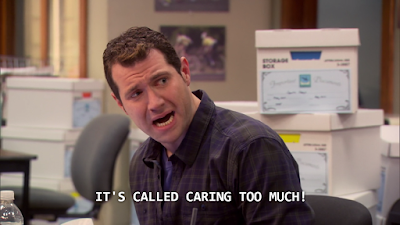Unless you are a murderer.
When we were teenagers it seemed like we had to hide everything we liked behind a facade of cool. Even if you were in one of those "don't give a damn" groups that didn't follow the trends, you had to pretend not to like anything mainstream! And if you were in the "go with the flow" group you couldn't mention your more obscure music/fashion/literary tastes. There wasn't really any way to win.
We'd probably like to think that once you reach a certain age you can just embrace the likes and dislikes that make you you - but that's not really the case. Sure you can say you like something that seems cringe, but it's always prefaced by a guilty face, or a kind of self-deprecating shrug, or the term "guilty pleasure". Why can't I just say I love all the High School Musical movies and know the words to literally every song, including the one about a talking fish, without laughing at myself while I'm speaking. The laugh is to let everyone know that you're aware how embarrassing your taste in movies is. The laugh is in preparation for their laugh. So you're all laughing together.
Sure, when you get to know people better they accept your quirks and it's less of a shameful secret. But it's all so arbitrary. In one group of friends someone will bring up Disney movies and everyone will argue passionately about which princess is the most feminist, or which prince they would marry, or which soundtrack is the number one greatest of all time. Then in another group you're again doing the guilty smile while admitting you love Disney films, as everyone else laughs at your desperate attempt to cling to your childhood while they have progressed to grown-up films like Saving Private Ryan. Because grown-ups love war movies. Fact.
What's funny is that a lot of "nerd culture" that used to be a slightly shameful secret has now gone mainstream. People wear their Star Wars merchandise with pride, and I have been regarded with shock and horror for admitting I've never seen any of the movies. People proudly post their photos at the hobbit shire in New Zealand, and the majority of fans visiting Harry Potter theme parks and studios are in their 20s and 30s.
Whether or not you say something is a guilty pleasure, or feel bad for confessing your love of something in general, depends entirely on who you are speaking to. We modify our behaviour depending on what kind of person we are speaking to. That's just a normal facet of human socialisation. But how often do we literally change the way we feel about something (inside) depending on the person we're speaking to? Because the feeling of shame or guilt leaves a trace that is hard to get rid of. If you're mocking your own obsession with Adventure Time to a companion one day, you will still feel the remnants of that self-deprecation the next time you watch an episode. We impose that embarrassment on ourselves.
All I'm saying is, if you love something then you have two choices. Don't mention it amongst a group that might not appreciate it to the same extent as you, or admit it with pride. Liking something that the person in front of you does not like is okay. Liking something that your close group of friends does not like is okay. Liking something that only 10 people in the world like is totally fine. Seriously, life is too confusing and complicated already without us having to pretend to ourselves that we're just like everyone else. Do what you like and to hell with the rest of them.
Again, this does not apply if your favourite hobby is killing people. It feels like it should be unnecessary to say this but: this blog does not endorse murder.
When we were teenagers it seemed like we had to hide everything we liked behind a facade of cool. Even if you were in one of those "don't give a damn" groups that didn't follow the trends, you had to pretend not to like anything mainstream! And if you were in the "go with the flow" group you couldn't mention your more obscure music/fashion/literary tastes. There wasn't really any way to win.
We'd probably like to think that once you reach a certain age you can just embrace the likes and dislikes that make you you - but that's not really the case. Sure you can say you like something that seems cringe, but it's always prefaced by a guilty face, or a kind of self-deprecating shrug, or the term "guilty pleasure". Why can't I just say I love all the High School Musical movies and know the words to literally every song, including the one about a talking fish, without laughing at myself while I'm speaking. The laugh is to let everyone know that you're aware how embarrassing your taste in movies is. The laugh is in preparation for their laugh. So you're all laughing together.
Sure, when you get to know people better they accept your quirks and it's less of a shameful secret. But it's all so arbitrary. In one group of friends someone will bring up Disney movies and everyone will argue passionately about which princess is the most feminist, or which prince they would marry, or which soundtrack is the number one greatest of all time. Then in another group you're again doing the guilty smile while admitting you love Disney films, as everyone else laughs at your desperate attempt to cling to your childhood while they have progressed to grown-up films like Saving Private Ryan. Because grown-ups love war movies. Fact.
What's funny is that a lot of "nerd culture" that used to be a slightly shameful secret has now gone mainstream. People wear their Star Wars merchandise with pride, and I have been regarded with shock and horror for admitting I've never seen any of the movies. People proudly post their photos at the hobbit shire in New Zealand, and the majority of fans visiting Harry Potter theme parks and studios are in their 20s and 30s.
Whether or not you say something is a guilty pleasure, or feel bad for confessing your love of something in general, depends entirely on who you are speaking to. We modify our behaviour depending on what kind of person we are speaking to. That's just a normal facet of human socialisation. But how often do we literally change the way we feel about something (inside) depending on the person we're speaking to? Because the feeling of shame or guilt leaves a trace that is hard to get rid of. If you're mocking your own obsession with Adventure Time to a companion one day, you will still feel the remnants of that self-deprecation the next time you watch an episode. We impose that embarrassment on ourselves.
All I'm saying is, if you love something then you have two choices. Don't mention it amongst a group that might not appreciate it to the same extent as you, or admit it with pride. Liking something that the person in front of you does not like is okay. Liking something that your close group of friends does not like is okay. Liking something that only 10 people in the world like is totally fine. Seriously, life is too confusing and complicated already without us having to pretend to ourselves that we're just like everyone else. Do what you like and to hell with the rest of them.
Again, this does not apply if your favourite hobby is killing people. It feels like it should be unnecessary to say this but: this blog does not endorse murder.





Comments
Post a Comment